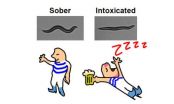(Press-News.org) New research from The University of Texas at Dallas demonstrates that drug paraphernalia triggers the reward areas of the brain differently in dependent and non-dependent marijuana users.
The study, published July 1 in Drug and Alcohol Dependence, demonstrated that different areas of the brain activated when dependent and non-dependent users were exposed to drug-related cues.
The 2012 National Survey on Drug Use and Health shows marijuana is the most widely used illicit drug in the United States. According to a 2013 survey from the Pew Research Center, 48 percent of Americans ages 18 and older have tried marijuana. The National Institute on Drug Abuse states that 9 percent of daily users will become dependent on marijuana.
"We know that people have a hard time staying abstinent because seeing cues for the drug use triggers this intense desire to seek out the drugs," said Dr. Francesca Filbey, lead author of the study and professor at the Center for BrainHealth in the School of Behavioral and Brain Sciences. "That's a clinically validated phenomenon and behavioral studies have also shown this to be the case. What we didn't know was what was driving those effects in the brain."
To find this effect, Filbey and colleagues conducted brain-imaging scans, called functional magnetic resonance imaging (fMRI), on 71 participants who regularly used marijuana. Just more than half of those were classified as dependent users. While being scanned, the participants were given either a used marijuana pipe or a pencil of approximately the same size that they could see and feel.
A comparison of the images revealed that the nucleus accumbens, the reward region in the brain, was activated in all users in response to the pipe. However, the strengths of the connections with other areas differed between dependent and non-dependent users.
"We found that the reward network is actually being driven by other areas unrelated to reward, like the areas in memory and attention or emotion," Filbey said.
Non-dependent users showed greater activations in the orbital frontal cortex and hippocampus, suggesting that memory and attention were connected to the activation of the reward network. Dependent users had greater activations in the amygdala and anterior cingulate gyrus, suggesting a more emotional connection.
Additionally, the areas of the brain activated resemble areas activated for other addictions, such as nicotine or cocaine, lending greater support to the addictiveness of marijuana.
These findings suggest that marijuana abuse intervention needs to cater more specifically to a user's level of addiction.
"Clinicians treating people with problems with marijuana dependence should consider the different processes that trigger the reward response when determining possible pharmacological or behavioral interventions," Filbey said.
INFORMATION:
Dr. Joseph Dunlop, researcher at UT Dallas, also worked on the study. Research was conducted in part at the Mind Research Network and was funded by a grant from the National Institute on Drug Abuse.
Marijuana dependence alters the brain's response to drug paraphernalia
2014-07-16
ELSE PRESS RELEASES FROM THIS DATE:
Dodos and spotted green pigeons are descendants of an island hopping bird
2014-07-16
The mysterious spotted green pigeon (Caloenas maculata) was a relative of the dodo, according to scientists who have examined its genetic make-up. The authors say their results, published in the open access journal BMC Evolutionary Biology, support a theory that both birds are descended from 'island hopping' ancestors.
The only known example of the spotted green pigeon is the Liverpool pigeon, which is currently in the World Museum, Liverpool. The only other known specimen has been lost, and there are no records of the bird in the wild. There is no record of where the ...
Patients at highest risk of suicide in first 2 weeks after leaving hospital
2014-07-16
Mental health patients are at their highest risk of dying by suicide in the first two weeks after leaving hospital - a report out today shows.
Around 3,225 patients died by suicide in the UK within the first three months of their discharge from hospital – 18% of all patient suicides, between 2002-2012.
The University of Manchester's National Confidential Inquiry into Suicide and Homicide by People with Mental Illness found that 526 patients died within the first week, the peak time of risk in England, Northern Ireland and Scotland; it is the first two weeks in Wales. ...
Underlying cause of cerebral palsy could lie in family links
2014-07-16
This is the first study to investigate cerebral palsy over such a broad range of family relationships.
Cerebral palsy is the most common cause of physical disability in children, affecting approximately two in 1,000 live births in the developed world (and many more elsewhere). It originates from damage to the 'immature' brain and several risk factors in pregnancy have been identified such as preterm delivery, abnormal growth, exposure to infection and lack of oxygen at birth.
Previous studies have found a possible family link with cerebral palsy, but positive findings ...
Is it time to lock up those who commit research fraud?
2014-07-16
Dr Zulfiqar Bhutta, Robert Harding Chair in global child health and policy and Co-Director of the Centre for Global Child Health at the Hospital for Sick Children, Toronto believes that criminal sanctions are necessary to deter growing research misconduct.
He says the fact that research fraud is common is no longer news, but a review by PubMed in 2012 found that 67% of research article retractions were "attributable to scientific misconduct, including fraud or suspected fraud".
Dr Bhutta says the consequences of research fraud on human health can be "huge" and that ...
Mutation stops worms from getting drunk
2014-07-16
Neuroscientists at The University of Texas at Austin have generated mutant worms that do not get intoxicated by alcohol, a result that could lead to new drugs to treat the symptoms of people going through alcohol withdrawal.
The scientists accomplished this feat by inserting a modified human alcohol target into the worms, as reported this week in The Journal of Neuroscience.
"This is the first example of altering a human alcohol target to prevent intoxication in an animal," says corresponding author, Jon Pierce-Shimomura, assistant professor in the university's College ...
Rainwater discovered at new depths
2014-07-16
University of Southampton researchers have found that rainwater can penetrate below the Earth's fractured upper crust, which could have major implications for our understanding of earthquakes and the generation of valuable mineral deposits.
It had been thought that surface water could not penetrate the ductile crust - where temperatures of more than 300°C and high pressures cause rocks to flex and flow rather than fracture - but researchers, led by Southampton's Dr Catriona Menzies, have now found fluids derived from rainwater at these levels.
Fluids in the Earth's crust ...
Transplantation of new brain cells reverses memory loss in Alzheimer's disease model
2014-07-16
SAN FRANCISCO, CA—A new study from the Gladstone Institutes has revealed a way to alleviate the learning and memory deficits caused by apoE4, the most important genetic risk factor for Alzheimer's disease, improving cognition to normal levels in aged mice.
In the study, which was conducted in collaboration with researchers at UC San Francisco and published today in the Journal of Neuroscience, scientists transplanted inhibitory neuron progenitors—early-stage brain cells that have the capacity to develop into mature inhibitory neurons—into two mouse models of Alzheimer's ...
JAMA study: Stroke risk and death rates fall over past 2 decades
2014-07-15
Fewer Americans are having strokes and those who do have a lower risk of dying from them finds a new study led by Johns Hopkins Bloomberg School of Public Health researchers.
The study found a 24 percent overall decline in first-time strokes in each of the last two decades and a 20 percent overall drop per decade in deaths after stroke. However, the decline in stroke risk was concentrated mainly in the over-65 set, with little progress in reducing the risk of strokes among young people. In contrast, the drop in stroke-related deaths each decade was primarily found among ...
Physicians struggle to clinically diagnose early HIV infection
2014-07-15
Despite the belief that early HIV infection presents with a well recognized flu-like syndrome, most physicians are unable to use clinical skills to differentiate those who should and should not be tested for HIV infection, according to a study published July 15 in Journal of the American Medical Association (JAMA).
Researchers at the BC Centre for Excellence in HIV/AIDS and University of British Columbia, Oregon Health and Science University, and Duke University Medical Centre analyzed data from over 24,000 patients, and discovered physicians have great difficulty recognizing ...
Study finds decrease in incidence of stroke, subsequent death
2014-07-15
In a study that included a large sample of black and white U.S. adults from several communities, rates of stroke incidence and subsequent death decreased from 1987 to 2011, with decreases varying across age-groups, according to a study in the July 16 issue of JAMA.
Stroke ranks fourth among all causes of death in the U.S. and is recognized as a leading cause of serious physical and cognitive long-term disability in adults. Almost 800,000 Americans suffer a stroke each year, and over 600,000 of them are first-ever events. Stroke incidence varies by gender and ethnic group, ...


